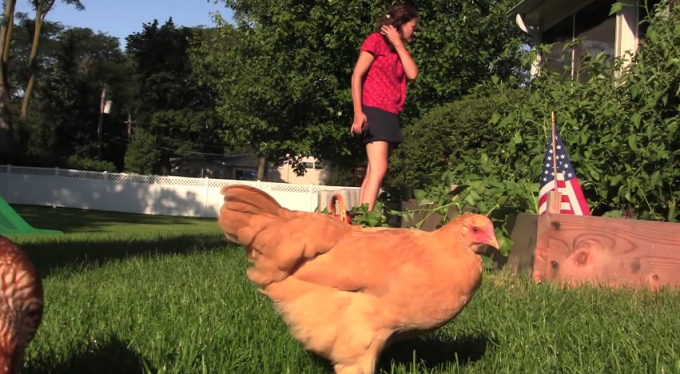Between high blood pressure, diabetes, and obesity, the United States’ current health concerns read like the Grim Reaper’s Christmas wish list. When chain restaurants aren’t offering the latest over-salted, over-processed food-like substances, Americans’ store-bought meat and produce contain chemicals and super antibiotics that Food Patriots argues do more harm than good for consumers’ health. The remedy? A “10% change in eating habits.” By the end of his documentary, director Jeff Spitz proposes a seemingly simple suggestion that looks to slowly shift the way we purchase and ultimately think about our food. Er, at least I think that’s what those chickens were for.
The opening moments of Food Patriots feature Spitz behind the camera as he documents his suburban Chicago family’s attempts to raise chickens in their own backyard. Raising chickens is definitely an “out there” idea, and despite Spitz’s lighthearted voiceover making it clear he’s in on the ridiculousness, finding the connection between the Spitz family’s “10%” suggestion and home-raised fowl is tough. At its best, the Spitzes’ decision to raise chickens is a hasty overreaction to son Sam contracting a debilitating food-borne illness. At its worst, Food Patriots is preaching to the choir.
In addition to the Spitz home in Chicago, much of the film is dedicated to renewable efforts in Madison, where son Sam spent some of his undergraduate career. Jeff Spitz shadows one Madison-area farmer as he promotes healthy eating in area schools, in addition to running a handful of self-organized farmers’ markets. In another instance, a UW student relays her positive experiences with the environmentally- and community-conscious “Slow Food Cafe.” Food Patriots makes it look like change is occurring in real time in Madison despite, for example, the fact that UW’s Slow Food Cafe first opened in 2007.
In this writer’s opinion, Madison is already host to a thriving collection of farmers’ markets, co-ops, and community pharmacies in addition to ancillary programs like “market baskets.” The prime goal of Food Patriots, raising agricultural awareness likely wouldn’t make Madison’s top priorities. Spitz touches on the slow trend toward urban gardening in Chicago, where local produce is grown out of refashioned slums and demolished buildings, but the 10% movement seems to have long caught on in these progressive cities. What’s the approach in under-developed parts of Milwaukee? How does one propose change in Detroit?
Even if one were to ignore the sweeping idealism in Food Patriots’ plea, shopping at farmers’ markets and co-ops, regardless of their associated economic and health benefits, is expensive. A dozen of Eggland’s Best can cost less than a third of what organic eggs go for, and even if one chooses to make their 10% change in a different aisle of the grocery store, the film’s suggestion ignores the budgetary constraints behind school lunch menus or the growing prevalence of “food deserts” in impoverished and underdeveloped neighborhoods. And is the fast food industry expected to partake in this change? Or is it best for Americans to give up on those food-like substances altogether? The 10% in the Spitz philosophy seems small, akin to a “one small step at a time” groupthink, but it’s hard for me to shake the thought that any substantive dietary change won’t reach past the country’s middle-class and predominantly non-minority areas.
To their credit, the Spitzes have done more than make a documentary. Groundswell Educational Films, the family’s production company, has used the momentum of Food Patriots to create a broader public engagement campaign. They’ve even lobbied with the Pew Foundation in support of the Preservation of Antibiotics for Medical Treatment Act (H.R. 1150). The Spitz family clearly cares about the issues they raise. It’s to the fault of Food Patriots then that their noble outreach efforts feel so trivial in the film.
In a recent piece for Arts Extract, Scott Gordon remarked on his growing distaste for the “insular lefty box” of political documentaries like Wisconsin Rising, which is also playing at this year’s Wisconsin Film Festival. While nutrition contains broader lines and harder facts than any political persuasion, I can’t shake the feeling that Food Patriots is part of a similar echo-chamber. Understanding where one’s food comes from is tremendously important, but situating that cause within a community that already knows it feels like a wasted opportunity.

